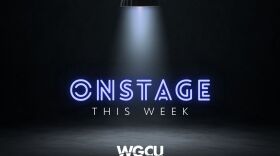“What does it cost to be kind?” sings Sue Snell in “The World According to Chris” in an early scene in “Carrie: The Musical.”
- The world according to Chris is
- Better to strike than get struck
- Better to screw than get screwed
- You'd probably think it's bizarre
- But that's the way things are!
- But that doesn't mean it has to be that way
- What does it cost to be kind?
Perhaps the better question is “Are you prepared to pay the price of being cruel and hateful?”
Alas, bullies rarely consider the consequences of their actions, least of all Carrie’s chief tormenter, Chris Hargensen, played with menace and malice by Shaelyn Crabtree. She sums up the story in two succinct sentences.

“It’s about Carrie White, a girl who has a very, very troubled home life, doesn’t really fit in with everybody else. And it’s kind of a story of the bullies at her school and kind of her revenge.”
- Sometimes their hatred is out of control
- God, how they hurt me!
- Mama says suffering is good for the soul
- But they hurt me
- And if I could, I'd bring them all down to their knees!
- I'd make them sorry forever for teasing Carrie
- Carrie, Carrie!

Crabtree says that people's reactions range from surprise to dismay when they learn that the Stephen King horror has been converted into a musical.
“It’s a very powerful musical because it does tell a story while being extremely intense,” says Crabtree. “It’s got a lot of different twists and turns that really grab the audience.”
The musical aptly captures the novel’s dichotomy between attraction and repulsion, love and hate, hope and horror.

This contrast underpins the show’s haunting duet, “Evening Prayers,” in which Carrie’s mother asks forgiveness while Carrie blames herself for provoking her mother’s physical abuse.
Mama, you don't (I was wrong)
Need forgiveness from me
I know that you do (It hurts me)
What you have to (to hurt you.) (I'd rather die)
I want to dry all your tears (Then see you)
So you'll see (Suffer)
That I'm sorry for letting you down
(One day you'll bless me, by taking away)
God bless me now (Look inside your heart)
Can you look inside your heart
(That's where forgiveness must start)
Show me the mercy that you've always shown (After all)
Neither the storyline nor the lyrics shy away from the troubling issues of isolation, parental abuse, religious fanaticism and bullying.

In fact, substitute an AR-15 for telekinesis, and the show provides fresh insight into the uniquely American phenomenon of school shootings.
For that reason, Director Robin Sharee Murray is to be applauded for opting to include the blood drop that made the movie so memorable … even if some of Cultural Park’s regulars find the scene off-putting.

“I think we’re pushing the envelope a little bit, and we’re trying to break away and gain that extra audience,” Crabtree concedes. “So, I’m hoping that we bring in new people and that people who have been here for a while think it’s different and creative and are shocked by it.”
In the end, Carrie stands for the proposition that the true cost of bullying is paid not by the victim or even the perpetrators, but by all those who stand by and enable. Therein lies the true horror.
- Everyone jeez, shoot me please! put me out of my pain!
Am I a mess? yes! totally insane! If I am not missed - I don't exist, that's the greatest sin!
- I'd rather be shot! 'cause, life just doesn't begin
- Doesn't begin, doesn't begin
- Doesn't begin, doesn't begin until you're in!
"Carrie the Musical" opens at Cultural Park Theatre October 25 and runs through November 3.

MORE INFORMATION:
Go here for play dates, times and a full cast list.
Academy Award-winner Michael Gore ("Fame," "Terms of Endearment") wrote the score, with Academy Award-winner Dean Pitchford ("Fame," "Footloose") providing the lyrics. Together, they integrate high-energy pop songs for the ensemble with power ballads for the principals, fashioning Carrie into a powerful, modern, pop-rock musical with amazing and energizing moments.
Stephen King wrote the novel in 1974.
Brian DePalma adapted the novel into a film in 1976 starring Sissy Spacek and Piper Laurie.

The 1988 musical adaptation closed just five days after opening night. But the musical was revived off-Broadway in 2012, receiving multiple award nominations and the Best Off-Broadway Musical award from the Off-Broadway Alliance. The difference? The musical was ahead of its time. Bullying would not become a hot-button issue until after the Columbine school shooting in 1999.
Since Columbine, society has come to accept the phenomenon and consequences of bullying. “And now I know, that once you see you can’t unsee.”
Both the novel and the musical contain a number of memorable lines, such as “and then the world exploded” – five simple words that explain the dire ramifications that can attend bottling up strong emotions, such as fear, hate, sorrow and humiliation.








